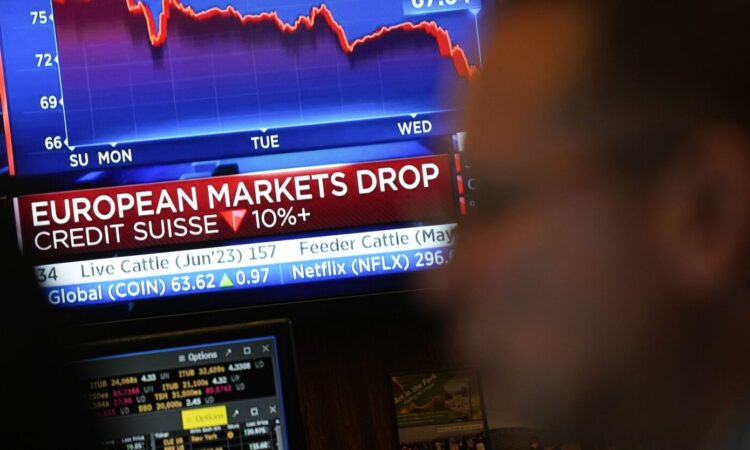
Tuesday stock rallies among U.S. regional banks were mostly wiped out by midday Wednesday as sector concerns spread to international markets and European banking stalwarts watched values tank as worried investors engaged in widespread selloffs.
Shares in Credit Suisse fell over 25% on Wednesday and stock trading for the banking giant was briefly paused on Swiss markets amid the precipitous decline.
Other European banks took a battering as concerns spread about the sector: France’s Societe Generale SA dropped 12%, France’s BNP Paribas fell more than 10%, Germany’s Deutsche Bank was down 8% and Britain’s Barclays Bank was down nearly 8%, per an Associated Press report. Shares in the two French banks were also briefly suspended.
U.S. stock indices were all down as of midday Wednesday, and a number of regional banks that saw stock gains Tuesday after big declines on Monday moved back into the red.
First Republic Bank has been under heightened investor scrutiny since the failures of Silicon Valley Bank last Friday and Signature Bank on Sunday. On Wednesday, the Wall Street Journal reported that S&P Global and Fitch Ratings downgraded First Republic’s credit, and its stock fell about 17% Wednesday morning. The San Francisco-based bank’s stock value is down more than 70% from a week ago.
As of midday on Wednesday, Fifth Third Bancorp slid more than 7%. Capital One Financial Corp. and PNC Financial Services each fell nearly 5%, while American Express Co. and Discover Financial Services were about 4% lower. U.S. Bancorp fell nearly 4%, according to the Journal.
Shares in Utah-based Zions Bank, which saw a 44% drop on Monday, had recovered a chunk of those losses by the end of regular trading on Tuesday, but were down around 2% for the day at midday Wednesday.
On Tuesday, Zions Bancorporation CEO and Chairman Harris Simmons told the Deseret News his bank, which operates over 400 branches across 11 western states, was well situated to ride out the turbulent aftermath of the Silicon Valley and Signature bank failures.
“We’ve created a great deal of liquidity, have an enormous amount of cash on our balance sheet and are highly comfortable with our ability to serve borrowers and depositors,” Simmons said. “As we have for the last 150 years.”





